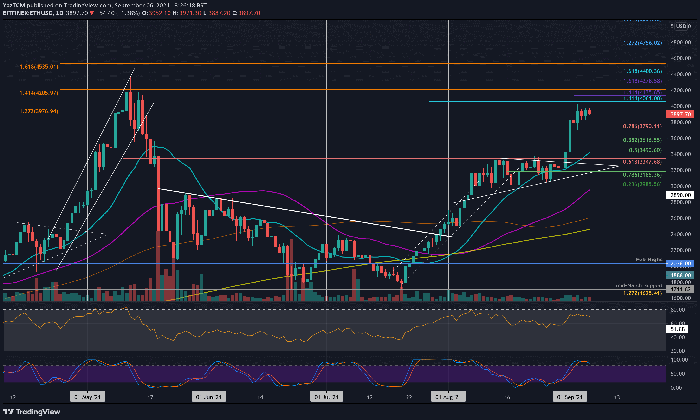In a significant development for the crypto industry, the repeal of the IRS DeFi Broker Rule marks a pivotal moment that aligns with the pro-crypto agenda championed by President Trump. By eliminating expanded tax reporting requirements for decentralized finance platforms, this move aims to foster innovation and mitigate regulatory hurdles that stifled growth in the sector. This legislation not only disrupts previous crypto regulations but also reflects a broader shift toward accommodating blockchain innovation, which is essential for future advancements in digital finance. As we approach 2025, discussions around crypto regulations will likely intensify, especially in the wake of Trump’s recent actions that could influence the trajectory of decentralized finance tax policies. Observers are keenly watching how this legislative change will impact investor sentiment and shield higher-income crypto investors from potential scrutiny under the IRS framework.
The recent legislative adjustments concerning decentralized finance have led to the termination of what was previously known as the IRS DeFi Broker Rule. This regulation, intended to broaden the definition of who qualifies as a broker in the crypto ecosystem, has been halted, promising new opportunities for players in the blockchain space. As the landscape evolves, the emphasis on decentralized financial transactions is becoming increasingly crucial, offering potential tax reform and a shift in regulatory practices. With the impending wave of crypto regulations set for 2025, industry stakeholders are reconsidering how these changes will influence investment practices and compliance within the decentralized finance market. The overall objective is to promote transparency and stimulate growth while fostering a competitive environment for blockchain innovation.
The Impact of Repealing the IRS DeFi Broker Rule
The decision to repeal the IRS DeFi Broker Rule is poised to reshape the landscape of decentralized finance in the United States. By eliminating the burdensome tax reporting requirements, decentralized finance platforms can now operate more freely, fostering innovation and attracting new developers to the space. The measure reflects recognition of the unique characteristics of blockchain technology, where transparency and privacy are foundational principles. Advocates for this move assert that the rule’s repeal will allow American entrepreneurs to thrive in a competitive global market, avoiding the migration of talent and investment to countries with more favorable regulations.
Furthermore, the regulation sparked concerns regarding user privacy, as the expanded definition of a broker could potentially infringe on the anonymity that many crypto enthusiasts value. The backlash from industry experts emphasized that decentralized finance platforms operate differently from traditional financial institutions. Therefore, enforcing regulations designed for centralized entities would not only be impractical but could also stifle innovation and deter participation in the burgeoning DeFi sector.
A New Era in Crypto Regulations: Trump’s Pro-Crypto Agenda
President Trump’s recent legislative actions signify a transformative shift in the regulatory approach towards the crypto industry. By establishing a federal crypto task force, the administration is seeking to streamline regulations that may impede blockchain innovation and development. This renewed focus on fostering a pro-crypto environment is expected to positively impact crypto regulations up to 2025 and beyond, encouraging further investment and entrepreneurial endeavors in the decentralized finance space.
As part of this pro-crypto agenda, Trump and his associates have reinforced their commitment to reducing regulatory burdens on entrepreneurs and innovators within the industry. By revising policies and potentially halting aggressive oversight from agencies like the SEC, the administration aims to create a more favorable atmosphere for blockchain innovation. As regulations evolve, the crypto community is keenly observing how these developments will affect investment strategies and operational frameworks moving forward.
Understanding the Congressional Review Act and Its Implications
The Congressional Review Act (CRA) plays a crucial role in shaping the regulatory environment surrounding decentralized finance and cryptocurrency. By allowing Congress to effectively nullify new regulations through a straightforward legislative process, the CRA has become a powerful tool for reversing policies that are viewed as overly restrictive or outdated. The repeal of the IRS DeFi Broker Rule under this act exemplifies how congressional intervention can reshape regulatory landscapes in favor of emerging technologies.
This mechanism provides an avenue for lawmakers to respond swiftly to evolving market dynamics and advancements in blockchain technology. As the CRA was employed to overturn the broker rule, it signals a precedent where lawmakers might reconsider or revoke regulations that do not align with the realities of the decentralized finance ecosystem. This opens doors for more adaptive policies that can keep pace with rapid advancements in technology and user needs.
How the DeFi Broker Rule Affecting Taxation Will Change
The repeal of the IRS DeFi Broker Rule signals a pivotal change in how taxation policies will be applied within the decentralized finance ecosystem. The original rule aimed to classify DeFi developers as brokers, requiring them to report extensive user transaction data, placing a burden on platforms that do not operate under traditional frameworks. By halting these requirements, the new legislation indicates a move towards developing a more nuanced approach to DeFi taxation that acknowledges the unique characteristics of these platforms.
Moving forward, stakeholders in the crypto industry, including developers and investors, can anticipate a more favorable taxation scenario where innovation is not hindered by onerous reporting obligations. The repeal suggests potential for crafting tax frameworks better aligned with DeFi operations, thus encouraging compliance without compromising the essence of decentralized finance.
The Future of Blockchain Innovation Post-DeFi Rule Repeal
With the repeal of the DeFi Broker Rule, the blockchain innovation landscape is ripe for exploration and growth. Investors and developers are poised to unveil new applications and platforms that leverage decentralized finance principles without the fear of heavy regulatory oversight. The removal of strict reporting requirements can lead to a surge in creative projects that prioritize user autonomy, transparency, and security — values that lie at the heart of decentralized networks.
As we shift into a new regulatory environment that recognizes and supports decentralized finance, businesses may find it easier to experiment with blockchain technology. The future of blockchain innovation could be marked by groundbreaking applications that challenge traditional financial systems, driving widespread adoption and engagement from various user demographics.
Responses from Industry Experts and Advocates
In the wake of the DeFi Broker Rule’s repeal, many industry experts and advocates have voiced their support for the new legislation, emphasizing its necessity for fostering a healthy entrepreneurial climate in the DeFi space. Prominent crypto advocates assert that the removal of restrictive tax reporting obligations is crucial for encouraging innovation and ensuring that the United States remains a key player in the global blockchain scene. Feedback from developers highlights the relief felt throughout the community, as they feel empowered to create without convoluted compliance measures.
Furthermore, the endorsement of this repealed legislation by key figures in Congress, including Representative Mike Carey and Senator Ted Cruz, showcases a bipartisan effort to support the growing importance of decentralized finance within the broader economic framework. Their advocacy for reduced interference reflects a growing consensus that regulatory measures must adapt to nurture rather than stifle innovation in the rapidly evolving crypto landscape.
The Role of Public Sentiment in Crypto Legislation
Public sentiment plays a pivotal role in shaping crypto legislation and the regulatory environment surrounding decentralized finance. The enthusiasm among investors and users for blockchain technology has prompted lawmakers to take notice, leading to more supportive measures such as the recent repeal of the DeFi Broker Rule. Acknowledging the vast potential of cryptocurrency in empowering individuals financially, elected officials have increasingly aligned their efforts with the public’s desire for flexibility and innovation.
Moreover, the growing popularity of decentralized finance solutions among retail investors reflects a shift in attitudes towards cryptocurrency. This increased visibility among the general populace has engendered a sense of urgency among legislators to respond with favorable policies that bolster consumer confidence and streamline participation in the crypto ecosystem.
Potential Consequences of Regulatory Changes on IRS Practices
The removal of the DeFi Broker Rule and its repercussions on IRS practices may lead to a significant transformation in how the agency approaches cryptocurrency taxation. Without the comprehensive reporting requirements initially set forth in the broker rule, the IRS may need to reevaluate its strategies for monitoring and taxing decentralized finance transactions. This development could signify a more collaborative relationship between the IRS and the crypto industry.
As the IRS adapts to the changing landscape, it may focus more on engaging with industry experts to develop guidelines that respect the unique attributes of DeFi platforms while still ensuring appropriate tax compliance. This shift could result in practical solutions that align agency goals with the realities of the cryptocurrency ecosystem, ultimately benefiting both taxpayers and regulatory authorities.
Conclusion: A Positive Shift for the Crypto Ecosystem
The repeal of the IRS DeFi Broker Rule marks a significant milestone for the crypto ecosystem, signifying a positive shift in regulatory attitudes towards decentralized finance. This move reinforces the idea that innovation should not be hampered by outdated regulations that fail to understand the distinct nature of blockchain-based platforms. As the repercussions of this decision unfold, it is expected to encourage more dynamic participation and investment in the sector.
Ultimately, the legislative changes inspired by Trump’s administration pave the way for a more balanced and supportive regulatory framework. Engaging with emerging technologies while taking user privacy and innovation into consideration can help foster a thriving environment for decentralized finance, maximizing its transformative potential in the broader financial landscape.
Frequently Asked Questions
What is the DeFi Broker Rule and why was it repealed?
The DeFi Broker Rule was an IRS regulation aimed at broadening the definition of a ‘broker’ to include developers of self-custodial wallets and decentralized finance (DeFi) applications. It was intended to enhance tax reporting requirements for crypto platforms. However, President Trump signed a bill repealing this rule on April 10, 2025, citing the need to protect innovation and privacy in the rapidly evolving DeFi landscape.
How does the repeal of the IRS DeFi Broker Rule affect decentralized finance platforms?
The repeal of the IRS DeFi Broker Rule significantly benefits decentralized finance platforms by removing onerous tax reporting requirements. This allows DeFi developers to operate without the fear of compliance issues related to user transaction reporting, which was technically unfeasible for platforms that do not store personal user data.
What are the implications of Trump’s crypto legislation on future IRS regulations?
Trump’s crypto legislation, which includes the repeal of the DeFi Broker Rule, prevents similar regulations from being reintroduced without new Congressional action. This sets a precedent for a more favorable regulatory environment for decentralized finance and blockchain innovation, encouraging growth within the U.S. crypto market.
What were the main criticisms of the DeFi Broker Rule prior to its repeal?
Critics argued that the DeFi Broker Rule was incompatible with the operational nature of decentralized platforms, as it required entities that do not handle personal information to comply with IRS reporting standards. Many feared that enforcing such regulations could drive innovation offshore and stifle growth within the U.S. crypto ecosystem.
How does the repeal of the DeFi Broker Rule align with broader crypto regulations for 2025?
The repeal of the DeFi Broker Rule aligns with a trend of decreasing regulatory restrictions on cryptocurrency markets in 2025. This reflects a shift in the legislative approach under President Trump, emphasizing support for blockchain innovation and the need for a more workable regulatory framework for the decentralized finance sector.
Will the repeal of the DeFi Broker Rule impact tax obligations for crypto investors?
While the repeal of the DeFi Broker Rule relieves decentralized platforms from extensive reporting obligations, crypto investors are still required to report their transactions and pay taxes on capital gains. This legislation, however, aims to make compliance simpler by keeping reporting responsibilities away from DeFi platforms themselves.
What role did Representative Mike Carey and Senator Ted Cruz play in the repeal of the DeFi Broker Rule?
Representative Mike Carey introduced the bill to repeal the DeFi Broker Rule, receiving support from Senator Ted Cruz. Their legislative efforts emphasized protecting innovation and taxpayer privacy in the cryptocurrency space, reflecting the growing momentum for pro-crypto policies within the Republican-led legislature.
What does the future hold for decentralized finance following the repeal of the DeFi Broker Rule?
Following the repeal of the DeFi Broker Rule, decentralized finance is poised for growth as developers can innovate without restrictive regulations. The government’s supportive stance, seen in Trump’s establishment of a federal crypto task force, suggests a potential flourishing of blockchain technology and investment in the crypto sector.
| Key Points |
|---|
| Trump signed a bill repealing the IRS DeFi Broker Rule on April 10, 2025, preventing expanded tax reporting for DeFi platforms. |
| The DeFi Broker Rule would have classified developers of DeFi applications and self-custodial wallets as brokers, requiring them to report transaction data. |
| Critics argued the rule was incompatible with the nature of decentralized platforms which don’t collect user data, complicating compliance. |
| The repeal is viewed as a win for innovation, privacy, and the continued growth of America’s crypto industry. |
| Trump’s administration supports pro-crypto policies, establishing a federal crypto task force to boost blockchain development. |
| The legislative process for the bill was swift, passing the House on March 11 and the Senate on March 26, indicating strong Republican support. |
Summary
The repeal of the IRS DeFi Broker Rule marks a significant moment for the cryptocurrency landscape. By overturning this regulation, President Trump has fostered an environment conducive to innovation and privacy in the decentralized finance sector. This decision not only impacts tax reporting requirements for DeFi platforms but also signifies a broader shift in regulatory attitudes towards cryptocurrency in the United States. With ongoing support for blockchain development, it positions the country to maintain its leading role in the global crypto industry.
In a significant development for the cryptocurrency landscape, the repeal of the IRS DeFi Broker Rule marks a triumph for the decentralized finance sector. By eliminating onerous tax reporting requirements, this legislative change underlines a commitment to fostering blockchain innovation and protecting user privacy. Recent actions, including Trump’s backing of this repeal, highlight the administration’s push against stringent crypto regulations expected to come into play by 2025. With concerns about the potential negative impact of the DeFi Broker Rule, such as driving innovation overseas and complicating compliance for developers, this move is seen as a pivotal step towards a more favorable environment for cryptocurrencies. As the IRS DeFi repeal takes effect, stakeholders from various sectors are optimistic about the implications for decentralized finance and the broader market.
The recent decision to discard the controversial IRS regulations concerning decentralized finance brokers has stirred excitement across the crypto community. Dubbed the DeFi Broker Rule, these policy changes aimed to redefine regulatory structures around digital finance operations in the U.S. However, President Trump’s proactive legislation signals a shift towards more lenient oversight, particularly encouraging cryptocurrency growth as the landscape anticipates evolving standards by 2025. The elimination of such burdensome compliance measures is expected to catalyze a new wave of blockchain innovation and allow decentralized platforms to thrive without the threat of excessive regulation. As the dust settles on this significant repeal, industry experts and investors alike are eager to explore the newly unencumbered financial possibilities that lie ahead.














